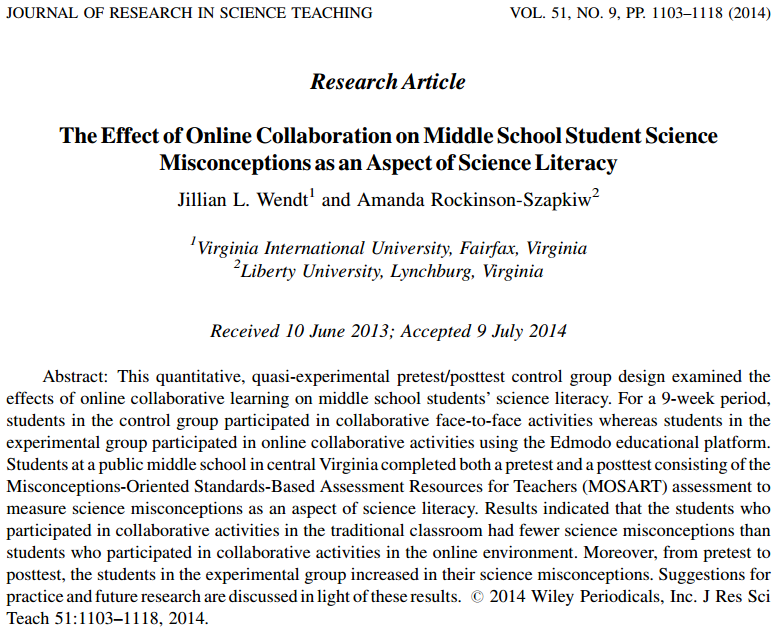Online Versus Face to Face
One can read a chemistry textbook from cover to cover. How much one would learn by doing so depends on one's motivation, the ability to comprehend, and the capacity to commit information to long term memory. Of course, the same factors are in play when trying to learn chemistry from an instructor. The important question is whether face-to-face interactions, what traditional classrooms offer, really makes a difference. This question is addressed in part by a study recently published in the Journal of Research in Science Teaching:
This study looks specifically at the difference between online and face-to-face collaborative learning among students in a public middle school (grade 8) in central Virginia. The online platform used in the study, Edmodo, allows students in the experimental group to work on their collaborative assignments, which include reading files, answering online quizzes, and participating in discussion threads.
The control group does all of the above as well, but inside the classroom, face-to-face. The assignments are identical and both groups of students receive instruction on the materials covered by the assignments. Thus, the only difference is how the students perform their assignments, face-to-face versus online. To assess the students, the MOSART exam (Harvard College, 2011), a test that measures understanding of key scientific concepts, has been utilized:
The results are unequivocal. Students from the online class perform poorly compared to the students who are in the face-to-face class:
One important lesson that should be learned from the above study is that the mere use of technology in the classroom does not necessarily translate to improvements in learning. Some activities like collaborative learning are much better facilitated face-to-face. The results of the above study certainly supports the notion that the DepEd's new K+12 curriculum is truly wrong-headed:

DepEd should realize that collaboration does not require technology. It actually happens a lot easier face-to-face. And it is cheaper to do this inside a classroom.
This study looks specifically at the difference between online and face-to-face collaborative learning among students in a public middle school (grade 8) in central Virginia. The online platform used in the study, Edmodo, allows students in the experimental group to work on their collaborative assignments, which include reading files, answering online quizzes, and participating in discussion threads.
 |
| To learn more about Edmodo, please visit this link |
The control group does all of the above as well, but inside the classroom, face-to-face. The assignments are identical and both groups of students receive instruction on the materials covered by the assignments. Thus, the only difference is how the students perform their assignments, face-to-face versus online. To assess the students, the MOSART exam (Harvard College, 2011), a test that measures understanding of key scientific concepts, has been utilized:
 |
| Above is a screen capture of the Mosart site. |
One important lesson that should be learned from the above study is that the mere use of technology in the classroom does not necessarily translate to improvements in learning. Some activities like collaborative learning are much better facilitated face-to-face. The results of the above study certainly supports the notion that the DepEd's new K+12 curriculum is truly wrong-headed:

DepEd should realize that collaboration does not require technology. It actually happens a lot easier face-to-face. And it is cheaper to do this inside a classroom.


Comments
Post a Comment